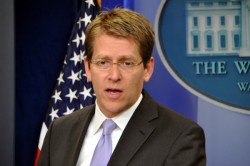National
Will Obama oppose cuts to HIV/AIDS programs in deficit reduction?
Carney can’t answer whether President will oppose reductions to HIV/AIDS initiatives

White House Press Secretary Jay Carney stopped short Monday of saying that President Obama would oppose any cuts to federally funded HIV/AIDS initiatives that would emerge in Congress as a result of the debt agreement.
In response to an inquiry from the Washington Blade, Carney said he’d have to offer a response later on whether Obama would speak out against cuts to HIV/AIDS prevention, drug prevention or research as part of the deficit reduction efforts as part of the debt agreement— or whether the President would voice opposition to such cuts in his recommendations to Congress on cuts to federal programs.
“I’m not aware of any specific cuts in that direction as part of this deal,” Carney said. “I’ll have to take your question because I don’t think that level of specificity exists at this point. The fact is that we feel very strongly that research is essential and we’ll continue to support it, but on this specific issue, I have to take your question.”
The White House didn’t respond in time for this posting in response a request for more details on whether the President would oppose any reductions to these HIV/AIDS initiatives.
The debt deal signed last week into enables President Obama to raise the debt ceiling by $2.1 trillion and eliminates the need for another increase until 2013, but also requires a total of nearly $2.5 trillion in spending cuts to reduce the federal deficit.
Advocates have expressed concern that the Centers for Disease Control & Prevention, the Ryan White HIV/AIDS Program, AIDS research initiatives and AIDS Drug Assistance Programs could be among the programs on the chopping block — in addition to the services the Medicare and Medicaid provide to people living with HIV/AIDS.
The agreement calls for a first tranche of spending cuts that total nearly $1 trillion over 10 years. Those cuts include $350 billion from the defense budget, but the remaining cuts could impact discretionary HIV/AIDS initiatives. However, Medicare and Medicaid — as well as the services they provide to people with living with HIV/AIDS — are protected under this first round of cuts.
To institute more cuts, the deal creates a bipartisan panel that has become known as a “Super Committee” made up of congressional leaders and will be required to identify an additional $1.5 trillion in deficit reduction. Both Medicare and Medicaid as well as discretionary HIV/AIDS initiatives could be cut for this round of cuts.
Should Congress fail to act on the committee’s recommendations, a trigger mechanism will be enacted for mandatory spending cuts. Those cuts — which would begin in January 2013 — will be split 50/50 between domestic and defense spending, although Social Security, Medicare beneficiaries and low-income programs would be exempt from those cuts.
In a statement at the White House Monday, Obama said he’d issue a recommendation to the “Super Committee” on the best path forward for finding $1.5 trillion in budget cuts, but offered limited details in his speech about his plan.
“I intend to present my own recommendations over the coming weeks on how we should proceed,” Obama said. “And that committee will have this administration’s full cooperation. And I assure you, we will stay on it until we get the job done.”
The President said the U.S. government can’t make much further cuts to defense and domestic spending and predicted the remainder the deficit reduction would come from “tax reform that will ask those who can afford it to pay their fair share and modest adjustments to health care programs like Medicare.”
Carl Schmid, deputy executive director of the AIDS Institute, said Carney is right that the super committee “won’t get down to that level for discretionary programs” for HIV/AIDS programs, but said the actions of the committee could lead to specific reductions to these initiatives later in the process
“The overall cuts will be decided and then the appropriations committees will come up with the details,” Schmid said. “Also [we’re] very concerned about cuts to Medicaid and Medicare which will also impact people with AIDS.”
Schmid added that he’d like the administration “protect cuts to patients” by articulating opposition to reductions in federally funded HIV/AIDS initiatives in his recommendations to Congress and elsewhere.
UPDATE: Shin Inouye, a White House spokesperson, issued the following statement in the response to the Blade’s request to follow up on the issue:
“The deal is a down payment on deficit reduction so that we begin to live within our means,” Inouye said. “The nearly $1 trillion in discretionary spending cuts are achieved through spending caps both on security and non-security spending. Specifics about how these levels will be met will be determined through discussions between the Administration and appropriators in Congress over the coming months.”
Federal Government
UPenn erases Lia Thomas’s records as part of settlement with White House
University agreed to ban trans women from women’s sports teams

In a settlement with the Trump-Vance administration announced on Tuesday, the University of Pennsylvania will ban transgender athletes from competing and erase swimming records set by transgender former student Lia Thomas.
The U.S. Department of Education’s Office for Civil Rights found the university in violation of Title IX, the federal rights law barring sex based discrimination in educational institutions, by “permitting males to compete in women’s intercollegiate athletics and to occupy women-only intimate facilities.”
The statement issued by University of Pennsylvania President J. Larry Jameson highlighted how the law’s interpretation was changed substantially under President Donald Trump’s second term.
“The Department of Education OCR investigated the participation of one transgender athlete on the women’s swimming team three years ago, during the 2021-2022 swim season,” he wrote. “At that time, Penn was in compliance with NCAA eligibility rules and Title IX as then interpreted.”
Jameson continued, “Penn has always followed — and continues to follow — Title IX and the applicable policy of the NCAA regarding transgender athletes. NCAA eligibility rules changed in February 2025 with Executive Orders 14168 and 14201 and Penn will continue to adhere to these new rules.”
Writing that “we acknowledge that some student-athletes were disadvantaged by these rules” in place while Thomas was allowed to compete, the university president added, “We recognize this and will apologize to those who experienced a competitive disadvantage or experienced anxiety because of the policies in effect at the time.”
“Today’s resolution agreement with UPenn is yet another example of the Trump effect in action,” Education Secretary Linda McMahon said in a statement. “Thanks to the leadership of President Trump, UPenn has agreed both to apologize for its past Title IX violations and to ensure that women’s sports are protected at the university for future generations of female athletes.”
Under former President Joe Biden, the department’s Office of Civil Rights sought to protect against anti-LGBTQ discrimination in education, bringing investigations and enforcement actions in cases where school officials might, for example, require trans students to use restrooms and facilities consistent with their birth sex or fail to respond to peer harassment over their gender identity.
Much of the legal reasoning behind the Biden-Harris administration’s positions extended from the 2020 U.S. Supreme Court case Bostock v. Clayton County, which found that sex-based discrimination includes that which is based on sexual orientation or gender identity under Title VII rules covering employment practices.
The Trump-Vance administration last week put the state of California on notice that its trans athlete policies were, or once were, in violation of Title IX, which comes amid the ongoing battle with Maine over the same issue.
New York
Two teens shot steps from Stonewall Inn after NYC Pride parade
One of the victims remains in critical condition

On Sunday night, following the annual NYC Pride March, two girls were shot in Sheridan Square, feet away from the historic Stonewall Inn.
According to an NYPD report, the two girls, aged 16 and 17, were shot around 10:15 p.m. as Pride festivities began to wind down. The 16-year-old was struck in the head and, according to police sources, is said to be in critical condition, while the 17-year-old was said to be in stable condition.
The Washington Blade confirmed with the NYPD the details from the police reports and learned no arrests had been made as of noon Monday.
The shooting took place in the Greenwich Village neighborhood of Manhattan, mere feet away from the most famous gay bar in the city — if not the world — the Stonewall Inn. Earlier that day, hundreds of thousands of people marched down Christopher Street to celebrate 55 years of LGBTQ people standing up for their rights.
In June 1969, after police raided the Stonewall Inn, members of the LGBTQ community pushed back, sparking what became known as the Stonewall riots. Over the course of two days, LGBTQ New Yorkers protested the discriminatory policing of queer spaces across the city and mobilized to speak out — and throw bottles if need be — at officers attempting to suppress their existence.
The following year, LGBTQ people returned to the Stonewall Inn and marched through the same streets where queer New Yorkers had been arrested, marking the first “Gay Pride March” in history and declaring that LGBTQ people were not going anywhere.
New York State Assemblywoman Deborah Glick, whose district includes Greenwich Village, took to social media to comment on the shooting.
“After decades of peaceful Pride celebrations — this year gun fire and two people shot near the Stonewall Inn is a reminder that gun violence is everywhere,” the lesbian lawmaker said on X. “Guns are a problem despite the NRA BS.”
New York
Zohran Mamdani participates in NYC Pride parade
Mayoral candidate has detailed LGBTQ rights platform

Zohran Mamdani, the candidate for mayor of New York City who pulled a surprise victory in the primary contest last week, walked in the city’s Pride parade on Sunday.
The Democratic Socialist and New York State Assembly member published photos on social media with New York Attorney General Letitia James, telling followers it was “a joy to march in NYC Pride with the people’s champ” and to “see so many friends on this gorgeous day.”
“Happy Pride NYC,” he wrote, adding a rainbow emoji.
Mamdani’s platform includes a detailed plan for LGBTQ people who “across the United States are facing an increasingly hostile political environment.”
His campaign website explains: “New York City must be a refuge for LGBTQIA+ people, but private institutions in our own city have already started capitulating to Trump’s assault on trans rights.
“Meanwhile, the cost of living crisis confronting working class people across the city hits the LGBTQIA+ community particularly hard, with higher rates of unemployment and homelessness than the rest of the city.”
“The Mamdani administration will protect LGBTQIA+ New Yorkers by expanding and protecting gender-affirming care citywide, making NYC an LGBTQIA+ sanctuary city, and creating the Office of LGBTQIA+ Affairs.”
-

 U.S. Supreme Court5 days ago
U.S. Supreme Court5 days agoSupreme Court upholds ACA rule that makes PrEP, other preventative care free
-

 District of Columbia5 days ago
District of Columbia5 days agoActivists protest outside Hungarian Embassy in DC
-

 Virginia4 days ago
Virginia4 days agoSpanberger touts equality, reproductive rights in Arlington
-

 Books4 days ago
Books4 days agoTwo new books on dining out LGBTQ-style











